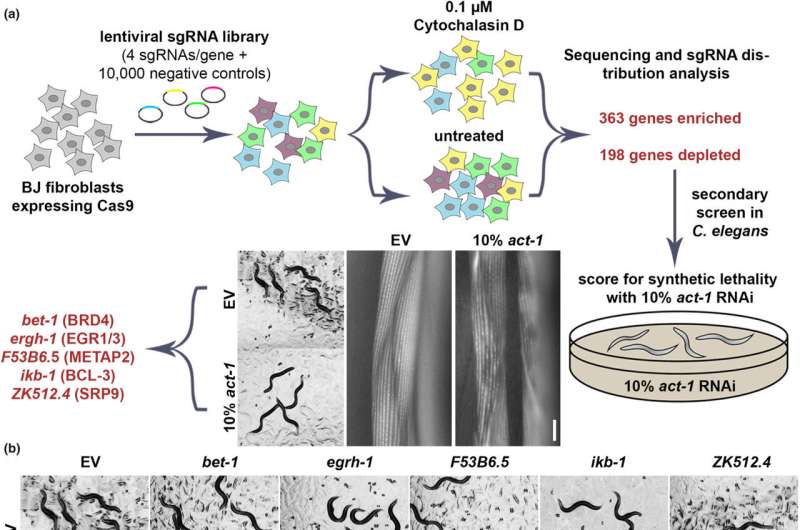Study identifies key protein that helps regulate the actin cytoskeleton

A recent study led by Assistant Professor of Gerontology Ryo Sanabria has identified a key protein that helps regulate the actin cytoskeleton, a scaffold of proteins within cells that makes their proper structure and function possible.
A review of genes both in the worm C. elegans and in human cells published in the journal Aging Cell revealed that the protein BET-1 promotes the proper function of actin, the protein that makes up the building blocks of the cytoskeleton. Overexpression of the gene for BET-1 appears to preserve actin function at later ages and improve health and lifespan in worms, according to the study.
Many of the cellular processes that depend on the actin cytoskeleton—from cell division to recycling damaged parts of the cell—deteriorate during aging and exposure to stress as the cytoskeleton breaks down. However, the regulatory mechanisms involved in preservation of cytoskeletal form and function are not well understood, Sanabria said. With the cytoskeleton being necessary for numerous cellular functions as well as maintaining its very shape, understanding its regulation and how well it responds to stressors over time could shed light on many aging-related illnesses.
How stress and aging affect cells
A large part of Sanabria's research interest is the intersection between stress and aging, including how organisms respond to stress, how stress impacts aging, and how organisms respond to stress at the cellular level. Stressors that affect organisms at the cell level can include heat, oxidation, infection, caloric restriction, and more.
"My lab has studied stress responses in three areas: the endoplasmic reticulum, which acts as a 'factory' for proteins, lipids, and other molecules within the cell; the mitochondria, where cells' energy is produced; and the actin cytoskeleton, which helps cells keep or change their shape as needed," Sanabria said. "Each of these systems has unique ways to respond to stress and maintain their health and function."
Exposure to stress can be detrimental to cellular health and fitness, Sanabria explained, and thus cells have adapted cellular stress responses that mitigate damage associated with stress exposure. Cellular stress mechanisms decline during aging, making older organisms more sensitive to stress; hyperactivating stress responses can promote resilience and improve general health and longevity, they added.
"When you're stressed, what's your capacity to bounce back? The more you can recover from a stressor, the healthier you are, but with aging there is less response and recovery," Sanabria explained. "But if you take a young person's stress resilience and give it to an older individual, will they be healthier?"
"Large-scale genetic screens identify BET-1 as a cytoskeleton regulator promoting actin function and life span" appeared online in Aging Cell on November 20, 2022.
More information: Gilberto Garcia et al, Large‐scale genetic screens identify BET ‐1 as a cytoskeleton regulator promoting actin function and life span, Aging Cell (2022). DOI: 10.1111/acel.13742
Journal information: Aging Cell
Provided by University of Southern California





















